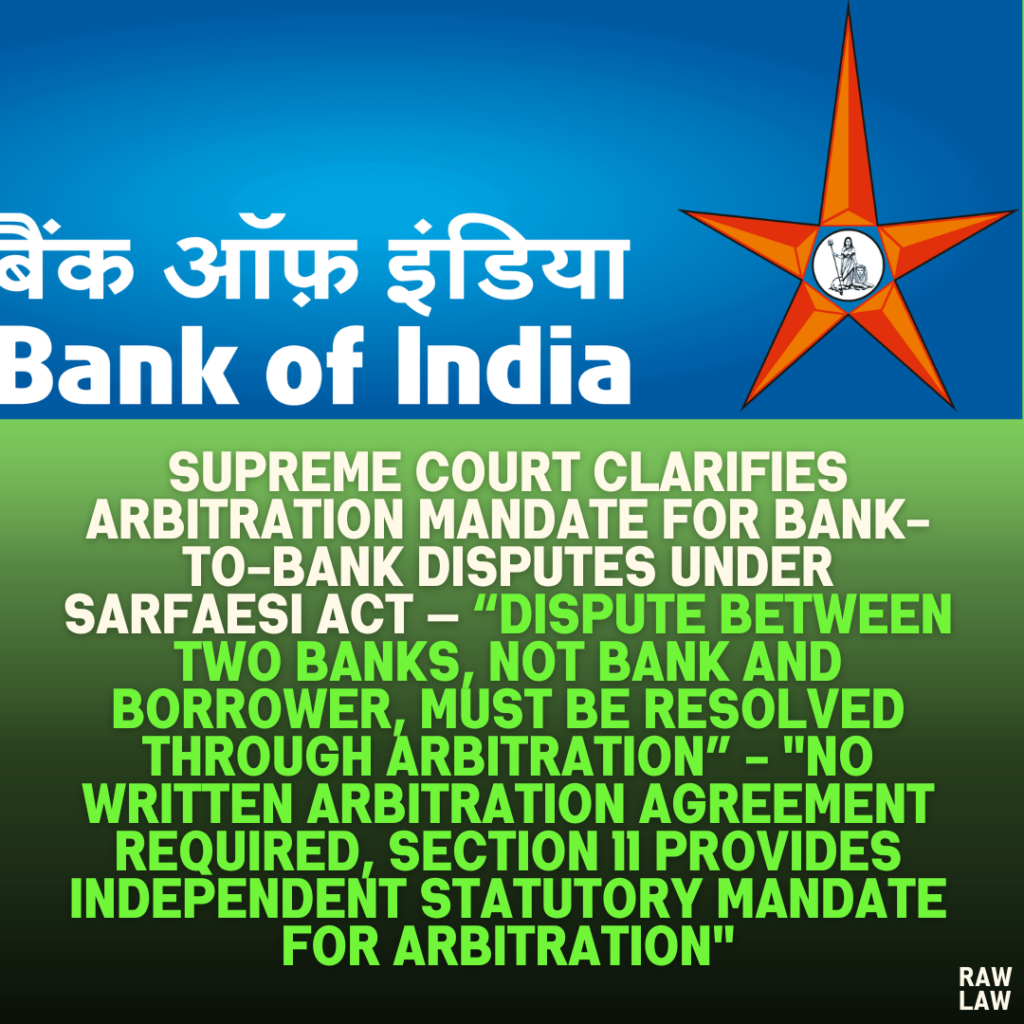Court’s Decision
The Supreme Court set aside the judgment of the Punjab & Haryana High Court dated 07.10.2020 and the subsequent order of the Debt Recovery Tribunal (DRT) dated 12.02.2020. It held that inter-se disputes between banks and financial institutions concerning “non-payment of any amount due” or enforcement of security interests under the Securitisation and Reconstruction of Financial Assets and Enforcement of Security Interest Act, 2002 (SARFAESI Act), must be referred to arbitration under Section 11 of the SARFAESI Act.
The Court ruled that:
“Section 11 is mandatory in nature. If a dispute arises between banks or financial institutions covered by the SARFAESI Act relating to non-payment of dues, it must be resolved through arbitration.”
Accordingly, the matter was remanded to the appropriate authority for appointment of an arbitrator to resolve the dispute between the appellant and respondent banks.
Facts
The borrower availed a credit facility from the appellant bank (Bank of India) in 2003, executing a Credit Facility Agreement in 2006 which barred the borrower from availing further loans or encumbering the secured assets without prior consent. While dues were still outstanding, the borrower took a loan from the respondent bank (Punjab National Bank) in 2013 by pledging the same stocks of rice and paddy already hypothecated to the appellant bank.
The appellant bank later discovered the pledge and claimed priority, asserting a prior hypothecation charge. The borrower defaulted, and the appellant bank classified the account as an NPA and issued demand notice under Section 13(2) of SARFAESI. Both banks laid claim over the same security.
Issues
- Whether the DRT had jurisdiction to adjudicate inter-se disputes between banks.
- Whether Section 11 of the SARFAESI Act mandates arbitration between banks or financial institutions.
- Whether the presence of a written arbitration agreement is necessary to invoke Section 11.
- Whether Section 11 is applicable to disputes concerning enforcement of security interest and not just securitisation and reconstruction.
Petitioner’s Arguments
- Section 11 was not applicable as there was no arbitration agreement between the banks.
- Section 31(b) excludes “pledge” from SARFAESI Act; hence, the respondent bank’s claim is outside the scope of the Act.
- The appellant bank held a prior charge by way of hypothecation created in 2003, while the pledge by respondent bank was created only in 2013.
- The DRT erred in declining jurisdiction; the dispute pertains to enforcement of security and falls within Section 17 of SARFAESI.
Respondent’s Arguments
- Dispute is between two banks, not between a bank and borrower; hence Section 17 is inapplicable.
- Section 11 mandates arbitration for such inter-se disputes.
- Even if pledge is excluded from the SARFAESI Act under Section 31(b), the overall scheme and Section 11 still apply since the dispute concerns “non-payment of dues”.
- Relied on government guidelines promoting arbitration in disputes between CPSEs.
Analysis of the Law
The Court traced the legislative intent of SARFAESI, highlighting how the Act was enacted to provide banks with swift remedies for enforcing securities without court intervention.
Section 11 was interpreted to:
- Mandate arbitration for any dispute between banks, financial institutions, ARCs, or qualified buyers regarding securitisation, reconstruction, or “non-payment of any amount due including interest.”
- Not require an independent arbitration agreement; Section 11 itself acts as a statutory arbitration clause.
- Apply broadly, covering even disputes concerning enforcement of security interest.
Precedent Analysis
The Court reviewed conflicting tribunal rulings:
- Oriental Bank of Commerce v. Canara Bank: DRT lacks jurisdiction over inter-se disputes between banks.
- Federal Bank Ltd. v. LIC Housing Finance Ltd.: Section 11 not applicable without arbitration agreement.
The Court resolved the conflict, affirming that no written arbitration agreement is required, and Section 11 provides an independent statutory mandate for arbitration.
Court’s Reasoning
- Section 11 of SARFAESI is self-contained and not dependent on a written arbitration agreement under the Arbitration and Conciliation Act, 1996.
- The phrase “any dispute relating to… non-payment of any amount due” is broad and includes disputes over enforcement and realisation of securities.
- Section 11 must be read harmoniously with the rest of the Act and interpreted to ensure the speedy resolution of disputes among financial institutions.
“Section 11 of the SARFAESI Act is couched in mandatory terms… [It] has to be read in consonance with the legislative object of ensuring expeditious recovery and enforcement of security interests.”
Conclusion
The Court held that the DRT lacked jurisdiction to entertain the dispute. Section 11 of the SARFAESI Act mandates that inter-se disputes between banks over non-payment of dues or enforcement of securities must be resolved through arbitration.
The appeal was allowed, and the matter was remanded for appointment of an arbitrator under the Arbitration and Conciliation Act, 1996.
Implications
This judgment settles the legal position on the scope of Section 11 SARFAESI Act, affirming:
- Disputes between banks concerning secured assets must be resolved via arbitration.
- No written arbitration agreement is necessary between the disputing banks.
- DRTs have no jurisdiction over such inter-se bank disputes.
This decision is likely to streamline the resolution of similar disputes and reduce the burden on DRTs, reaffirming the policy of speedy enforcement under SARFAESI.
